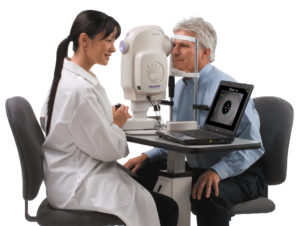Top Cataract Surgeons

Find the Best Cataract Surgeon Near You
You’ve been told you have a cataract. Now what? The decisions you make at this point could have a significant impact on your vision for the rest of your life. How long should you wait to have it replaced? What are the consequences of waiting? When you do decide to have surgery, how can you find a cataract surgeon with the experience and the technology necessary to provide the best possible outcomes?
What is a
Cataract?
What is a Cataract?
Cataracts affect more than 24.4 million Americans 40 or older, and they’re a natural part of our eyes’ aging process. The eye’s lens, which sits behind the iris, stiffens over time. As the lens loses its flexibility, you may need reading glasses to see things close to you. Eventually, the proteins in the lens of your eye begin breaking down and clumping, clouding the lens and making it difficult to see clearly. This is what we call a cataract.
Can You Fix a Cataract?
The only way to truly restore the vision loss because of a cataract is to surgically replace it with an artificial one. Some people find that they can manage the vision loss from their cataracts with a stronger prescription for glasses or contact lenses. However, as cataracts progress over time, they may start to impede your ability to perform everyday tasks, like driving or doing your job.
The best way to determine when you should consider having your natural lens surgically replaced with an intraocular lens (IOL) is to ask your eye surgeon to review the degree of dysfunction in your lens compared to your cornea. An objective, scientific comparison of the two parts that make up your vision will help you and your surgeon decide the appropriate time for lens replacement.
Selecting the Appropriate Lens
Selecting the right premium IOL means that you may longer need to wear any sort of corrective eyewear — glasses or contact lenses — after your surgery. However, a common mistake is to assume that getting cataract surgery will automatically lead to perfect vision. The key to clear vision is having an accurate picture of your eye and selecting a replacement lens based on your unique eye structure and existing refractive issues.
In addition to examining your natural lens, your surgeon should perform a comprehensive visual assessment to measure the size and shape of your cornea as well as the way light moves through your entire optical system. Your cornea and lens are both contributors to the overall clarity of your vision. Frequently, the shape of the cornea is the cause of nearsightedness, farsightedness, or astigmatism. If you have an astigmatism, for example, an experienced surgeon will be able to demonstrate how your vision would change if you selected a toric lens so that you can decide which implant you prefer.
Finding the Right Surgeon
When you surgically implant a replacement lens, it’s meant to last you a lifetime. We understand how important it is to find a qualified surgeon that has the capabilities to fully assess your eye before making such a big decision. That’s why we’ve compiled a list of the top cataract surgeons in every state. To find a surgeon near you or to find out if your surgeon made our list, click here.
copyright 2020 www.topcataractsurgeons.com
